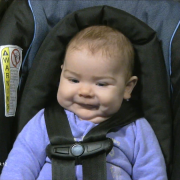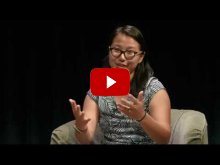We view ourselves and others as causal agents who pursue goals and act efficiently to make things happen, but where do these intuitions come from? In a new paper funded by the Center for Brains, Minds and Machines and published in PNAS, Harvard University researchers and co-authors Shari Liu, Neon Brooks, and Elizabeth Spelke show that three-month-old human infants, who do not yet reach for objects, nevertheless understand that when other people reach for an object, they do so with the intention of making things happen to it.
When 3-month-old infants, who lack experience reaching for objects, saw people reach over a barrier to cause an object to light up, young infants interpreted these actions as physically constrained. When the barrier subsequently disappeared, and the person reached again for the object, infants looked longer when the person performed the same curved “inefficient” reach than when the person performed a direct “efficient” reach: an indication that they expected the person to reach efficiently. In contrast, infants showed no consistent responses to similar actions that were more motorically complex (e.g. actions wherein a person grasped and lifted the object), or not causal (e.g. actions wherein a person reached towards the object but never contacted it, and the object illuminated after a delay).
This research addresses an age-old question in philosophy that is now actively studied in cognitive science, and AI: How do humans learn so much about the world, so quickly, and how can we engineer systems with the same kind of intelligence? Harvard graduate student and Lead author Shari Liu comments that “for human infants, the most prodigious natural learners in the known universe, the key to this learning problem might be a few initial hypotheses about the physical and psychological world, which are enriched through learning and experience.” In particular, the authors propose that an early-emerging sensitivity to the causal powers of agents, their goals, and the physical obstacles that stand in the way, may provide one important foundation for infants’ learning. Elizabeth Spelke, the Marshall L. Berkman Professor of Psychology at Harvard University and an investigator at the NSF-MIT Center for Brains, Minds and Machines, explains that “infants begin with almost no knowledge of how people can act on objects: how to pick up a ball instead of batting it away, or how to put down a cup so that it doesn’t fall over. But before they develop these specific abilities or understand these actions when others perform them, they already understand, implicitly, that other people cause their own actions, direct their actions to objects, act on those objects efficiently, and by acting, cause changes in the world. This abstract understanding is available, early in development, to guide infants’ learning.”
Read more about this in the paper entitled “Origins of the concepts cause, cost, and goal in prereaching infants”, S. Liu, Brooks, N. B., and Spelke, E. S., PNAS, 2019.


